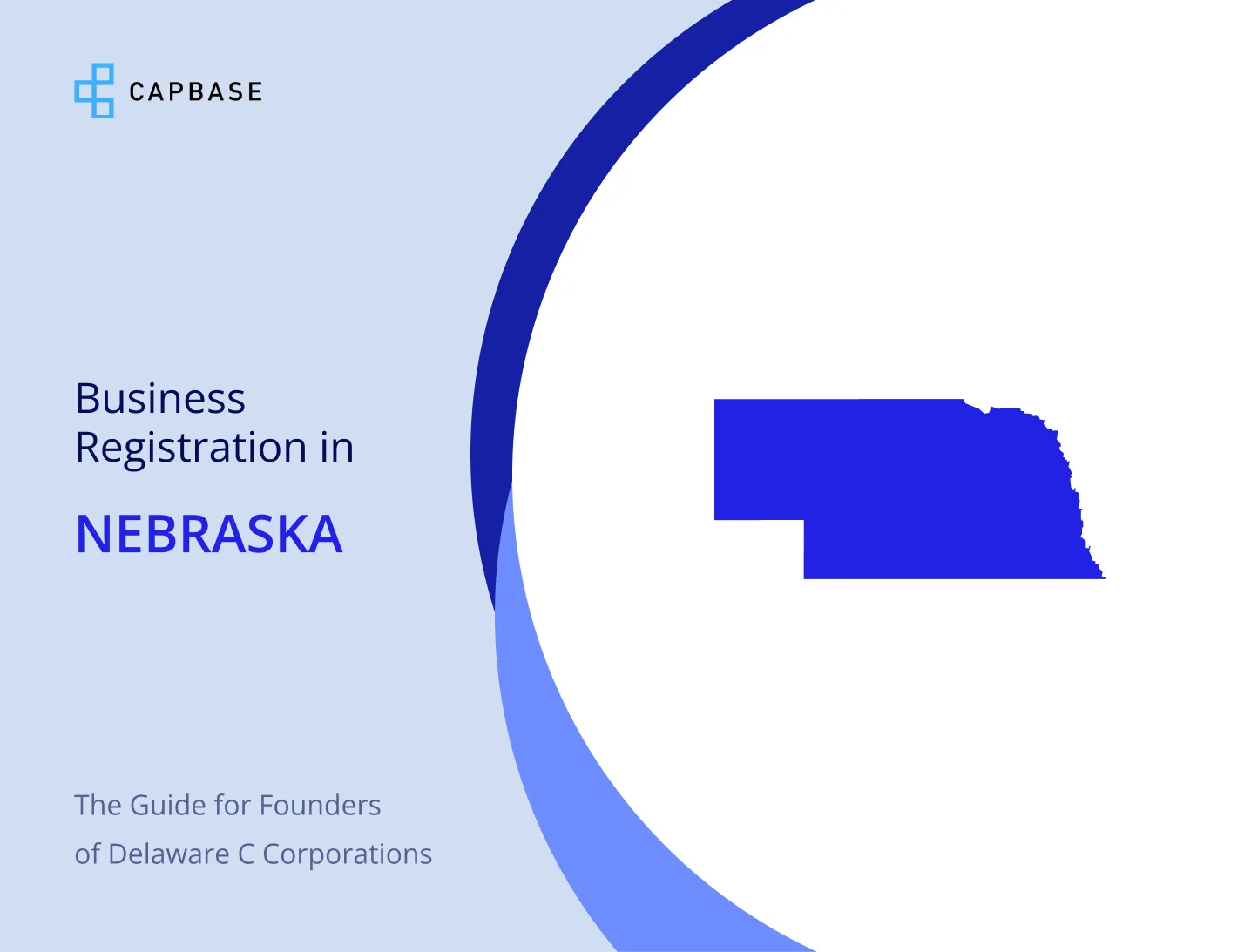
Registering Your Startup to Do Business in Nebraska
 by Capbase Staff • 7 min readpublished May 12, 2023 • updated December 4, 2023
by Capbase Staff • 7 min readpublished May 12, 2023 • updated December 4, 2023
Related

Stay ahead of the curve
You’ll get actionable advice, comprehensive guides, interviews with founders, and more.
Forming your business entity in Delaware—specifically, a corporation—gives you a lot of flexibility, but you may still need to follow local laws depending on what state you operate in.
Specifically, if you do business in Nebraska, you need to register with the state. We’ll walk through the process and simplify it. But first, how can you tell whether you’re legally doing business in Nebraska?
When to register as doing business in Nebraska
Delaware C corps—and all other corporations formed outside of Nebraska—are referred to as “foreign” corporations by the State.
Nebraska statutes do not specifically define what is considered doing business in the state. However, Nebraska statutes provide that the following activities would not require you to register with the State:
Defending or settling a lawsuit
Having a bank account in the state
Selling through independent contractors
When to register to collect sales tax in Nebraska
Every state has rules about when a company is required to pay sales tax. These are called sales tax nexus rules.
You can think of the nexus as a special version of that state’s border; if you perform certain business activities within that border, you fall into the state’s sales tax nexus, and you’re required to register for and collect state sales tax.
Typically, these actions take the form of buying and selling goods and services.
In Nebraska, the sales tax nexus rules only apply to sellers who sell physical goods or services to Nebraska residents.
Until 2018, selling or buying non-physical goods—like subscriptions to streaming services, SaaS memberships, etc.—did not, generally speaking, qualify you for sales tax nexus. After an important court ruling in 2018, that changed. Now, if you buy or sell non-physical goods or services in a state, you may fall within its sales tax nexus.
Nebraska sales tax nexus (physical goods and property)
If you have a physical presence in Nebraska, then you will likely need to collect and remit sales tax. You may be physically present in a state if you have warehouses, retail spaces, or employees and/or representatives of the business in the state.
You will need to pay sales tax as long as you have physical presence regardless of any minimum thresholds. You can learn more about physical presence for sales tax purposes through the State’s website.
Nebraska sales tax nexus (non-physical goods and property)
The new state sales tax laws applying to non-physical (ie. internet) sales allow you to qualify for sales tax nexus even without physical presence or goods. In Nebraska, you need to cross a certain threshold to qualify.
You will need to collect and remit sales tax if you do the following in the current or previous year:
- Collect $100,000 or more in retail sales from Nebraska; or
- Have 200 or more separate transactions into Nebraska
If you would like to take a deep dive, you can check out the State’s website.
As usual, this isn’t legal advice—just a guide. If you’re not 100% clear on whether you fall within Nebraska’s sales tax nexus, it’s best to confer with your legal counsel and/or an accountant that has expertise in Nebraska’s legal code and tax regulations.
How to register to do business in Nebraska
- Select a name under which to do business. This doesn’t have to be the name you registered when incorporating in Delaware, but it can be.
- Fill out an application. You’ll need to file an Application for Certificate of Authority to Transact Business to the Nebraska Secretary of State along with a Delaware Certificate of Good Standing.
- Pay the fee. Now you pay the Nebraska Secretary of State a $145 filing fee.
- Submit your Application for Certificate of Authority to Transact Business.
- Wait. Processing typically takes two to four weeks.
Once you’re approved to operate as a qualified foreign business in Nebraska, you’ll need to comply with certain requirements.
Compliance as a qualified business in Nebraska
To stay in compliance and continue legally doing business in Nebraska, you need to meet two requirements: maintaining a registered agent and filing your biennial report. On top of that, you will also need to pay a corporate income tax.
Registered agent in Nebraska
Your registered agent in Nebraska is your point of contact with local authorities. If you don’t have a physical address for your company in Nebraska, it may be advantageous to find a registered agent to receive state notices on your behalf.
Foreign corporations are required to have a registered office in Nebraska. The office cannot be a P.O. box, rather it must be a physical address of your registered agent or a licensed registered agent service.
Your registered agent will forward any important information, such as business mail, to you. There are a number of firms that contract out registered agents. They typically cost $50 – $100 per year.
Biennial reporting in Nebraska
Every year, you must file a statement with the State, updating any changes to the company address or the composition of the Board and officers. You’ll include info like:
- The legal name of your business
- The name and address of your registered agent
- The names and addresses of board members, managers, and officers
Your minimum filing fee for the biennial report is $52.
Paying your corporate income tax in Nebraska
Nebraska has a corporate income tax. The tax is imposed directly on the income of your corporation. For more information on filing and paying your corporation income tax, please see the following guidance from Nebraska’s Department of Revenue.
Registering for sales tax in Nebraska
If you meet the requirements to collect sales tax in Nebraska, you will need to register with the Nebraska Department of Revenue. Nebraska provides two ways for you to register to collect sales and use tax depending on what is best for your company:
- Nebraska Department of Revenue provides an online business registration portal which allows you to register for only Nebraska sales and use tax collection.
- Streamlined Sales Tax Registration System lets you register for sales tax for multiple states. Nebraska is part of this system so you can register to collect Nebraska sales and use tax through the Streamlined Sales Tax Registration System.
Hiring and paying employees in Nebraska
When you hire a new employee in Nebraska, federal and state laws require that you report new hires within 20 days of a new employee's hire date. You can report your new hires online.
Your payroll provider should be able to take care of paycheck withholdings, but it’s up to you to register as an employer with the State and set up an online employer account.
For a comprehensive guide of your responsibilities, Nebraska provides the following information.
The easiest way to register your business in Nebraska
To register your business in Nebraska, you’ve got to keep track of a lot of moving parts. Failing to file the right forms, provide the right information, or stay on top of compliance laws can lead to serious headaches.
Capbase makes it easy. When you incorporate your Delaware corporation on Capbase, we will generate the required information needed to register to do business in Nebraska and keep you up to date on any required filings.
The compliance calendar inside your Capbase account will notify you of upcoming fees, reporting, or other requirements, so you can keep your startup in good standing with Nebraska state officials. Try Capbase now.

Written by Capbase Staff
Capbase is a team of designers, engineers, and business professionals spread across 6 time zones on 3 continents united by our passion for dogs, coffee, and great software.
Related
American Samoa Business Entity Registration for Delaware Corporations
Is your company doing business in American Samoa? Get an easy-to-follow explanation about what forms you’ll need, information about registration fees, filing deadlines, naming requirements, and more.
 by Capbase Staff • 7 min read
by Capbase Staff • 7 min readRegistering Your Startup To Do Business In West Virginia
Is your company doing business in West Virginia? Get an easy-to-follow explanation about what forms you’ll need, information about registration fees, filing deadlines, naming requirements, and more.
 by Capbase Staff • 7 min read
by Capbase Staff • 7 min readRegistering Your Startup To Do Business In Maine
Is your company doing business in Maine? Get an easy-to-follow explanation about what forms you’ll need, information about registration fees, filing deadlines, naming requirements, and more.
 by Capbase Staff • 7 min read
by Capbase Staff • 7 min read